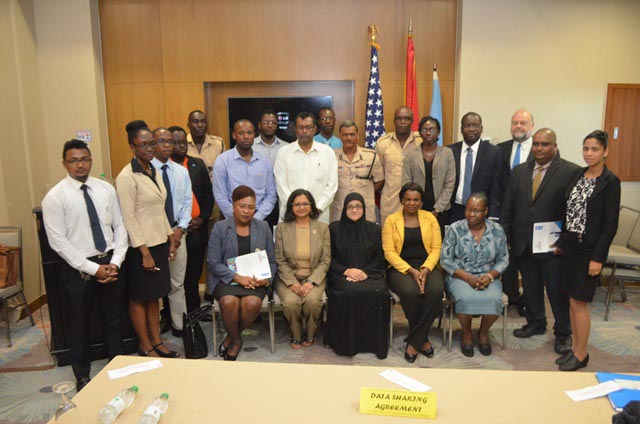As part of a collaborative effort to ensure that there is a targeted approach to crime and violence prevention in Guyana through proper data collection and analysis, a five-member National CariSECURE Task Force was yesterday launched.
“This task force is going to ensure the implementation of the project (CariSECURE) activities, which includes collecting data from all across the country, police stations, educational establishments, where there may be violence to students all being collected into one central observation”, Minister of Public Security Khemraj Ramjattan said moments before the members of the Task Force signed their letters of appointment.
The Task Force comprises Ramjattan, Director of Public Prosecutions (DPP), Shalimar Ali-Hack, Police Commissioner (ag) David Ramnarine, Solicitor General Kim Kyte-John and Director of Prisons (ag) Gladwyn Samuels. The formation of the Task Force is in keeping with the objectives of the Project.
The US$14M CariSECURE project aims to improve youth and crime violence policymaking and programming in Guyana and other Southern and Eastern Caribbean countries through the use of quality, comparable and reliable national citizen security information. The donor agencies are the United Nations Development Mission for Eastern and Southern Caribbean (USAID/ESC). The project which commenced on July 14, 2016, is slated to come to an end on October 13, 2020.
Speaking to a packed room at the Guyana Marriott Hotel, Ramjattan said that shelving surveys and papers detailing the crime situation in Guyana will not result in a solution. He reminded that in the past, he has said that there needs to be political commitment and financial arrangements in place, to address the issue of crime and citizen security.
While expressing satisfaction at the establishment of the Task Force, he said that the launching is the first step in “getting the work done”. Ramjattan stated that accurate digital crime data is very important to address the crime fight as it can evolve into a functional crime observatory with a capacity for statistical analysis, mapping of crimes as well as an ongoing surveillance to identify target areas for social programmes and interventions.
He said that this can also help in the analysis of crime data and the tracking of dangerous criminals and persons of interest. “That is what this programme is all about, the reconciliation of offenders by the Guyana Police Force and the disposal of those … through the court system”, he said.
He said the focus also has to be on ensuring that there is trained personnel available to analyze the data. He said that the CariSECURE project will also ensure that Guyana has the capacity to do evidence based policy making.
He said that the Task Force’s role also involves collaborating with the CariSECURE Project Management Unit, finding best approaches and mechanisms for effective implementation of the proposed Caribbean Citizens Security toolkit at the national level, facilitating assessment and the identification of the required hardware and training needs and designing the information technology architecture for a crime information system that is going to be state of the art.
The Task Force, he said will identify the risks, issues and challenges that may arise in the development and implementation of the integration progress and will recommend appropriate solution to address such challenges. Ramjattan insisted that if this initiative is to be successful there must be an inter-ministerial approach.
US Ambassador to Guyana Perry Holloway remarked that the Task Force has a critical role to play in contributing to the reduction of crime and violence in Guyana and the region as a whole.
He explained that the Caribbean Citizen Security Toolkit implementation represents in depth collaboration between USAID, UNDP, host-governments, and stakeholders including the CARICOM Secretariat, the Regional Security System, and the Organization of Eastern Caribbean States (OECS).
“The toolkit standardizes the data collection process for crime statistics, making it possible for law enforcement personnel to implement more effective crime prevention strategies. Other benefits are enhanced communication and better-informed decision making”, he said adding that the US government is proud to continue its long history of supporting the Government of Guyana in the areas of citizen security and youth empowerment. “We are pleased with the gains made under the CariSECURE initiative to date, which is part of the United States Agency for International Development’s (USAID) wider Youth Empowerment Services (YES) project”.
The YES project, he said uses the public health model for youth crime and violence prevention to define the problem; target interventions to address risk and protective factors facing both communities and at risk youth; and share results to foster evidence-based approaches to reducing youth crime and violence in Guyana and the region. The toolkit, Holloway said will enable policymakers to develop solutions that better target the problems.
Shabnam Mallick, UNDP’s Deputy Resident Representative said in brief comments that it is unfortunate that the Caribbean countries as a whole exhibit among the highest rates of violence in the world. She noted that multiple projects and initiatives are underway to tackle this crime and violence and pointed towards the CariSECURE project which she said is working towards developing solutions that will be applicable across the ten countries inclusive of Guyana.
According to Mallick part of the solution is a set of CariSECURE crime prevention tools which was officially adopted in Barbados last August, the purpose of which is to enhance the quality and integrity of national crime data, which will advance governments’ ability to incorporate crime data analysis to improve its crime prevention strategies.
Among those present were several ministers of the government including Education Minister Nicolette Henry and Minister of Indigenous Peoples Sydney Allicock and Head of the Special Organized Crime Unit (SOCU) Sydney James.






